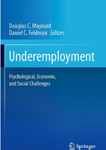 Authors: Michael R. Bashshur, Ana Hernández and José María Peiró
Authors: Michael R. Bashshur, Ana Hernández and José María PeiróTitle: The impact of underemployment on individual and team performance
Source: Underemployment: psychological, economic, and social challenges
Abstract: The focus of this article is on the effects of underemployment on how individuals perform in the workplace. Michael R. Bashshur, Ana Hernández, and José María Peiró examine the span of behaviors typically included under the umbrella of job performance, including core task performance, team performance, citizenship behavior, and counterproductive work behavior. The authors argue that, since underemployed workers have more than enough knowledge, skill and/or experience to effectively complete their jobs, their ability to perform their core task assignments is not an issue. However, because underemployed workers derive insufficient financial rewards and/or intrinsic satisfaction from performing their jobs, their motivation to do so conscientiously can suffer. Furthermore, underemployed workers are less likely to go above and beyond the call of duty at work, because doing so would only further increase their sense of inequity. In addition, while underemployment may be associated with lower citizenship behavior and greater withdrawal behaviors (e.g., absence), there is little evidence that it is associated with more destructive forms of counterproductive behavior.
Recommended citation:
Bashshur, M. R., A. Hernández and J.M. Peiró, 2011. "The impact of underemployment on individual and team performance", in Maynard, D. C. and D. C. Feldman (eds.): Underemployment: psychological, economic, and social challenges. New York: Springer, pp. 187-214.
Further articles






